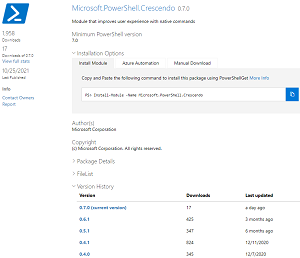News
PowerShell Crescendo Updated Prior to Release Candidate
Microsoft updated PowerShell Crescendo -- used to create native commands -- in advance of the next stage, a Release Candidate.
In announcing PowerShell Crescendo 0.7.0-Preview.4, program manager Jason Helmick said, "This is the last planned preview before the release candidate (RC). This preview adds support for a globally available schema, several community suggestions, and an experimental help parsing feature to improve complex native command maintenance." The tool was previewed in December of last year.
 [Click on image for larger view.] Microsoft.PowerShell.Crescendo 0.7.0 (source: Microsoft).
[Click on image for larger view.] Microsoft.PowerShell.Crescendo 0.7.0 (source: Microsoft).
Available in the PowerShell Gallery, Microsoft.PowerShell.Crescendo 0.7.0 is described as a module that improves user experience with native commands. Specifically, it's a framework for the rapid development of PowerShell cmdlets for native commands for all platforms. Its GitHub site gets into some details:
PowerShell is capable of invoking native applications like any shell. However, it would be an improved experience if the native command could participate in the PowerShell pipeline and take advantage of the parameter behaviors that are part of PowerShell.
The Crescendo module is an experiment to provide a novel way to create functions which invoke native commands by using a JSON configuration file.
The Microsoft.PowerShell.Crescendo module provides native commands a way to more easily participate in the PowerShell pipeline by facilitating parameter handling, converting native output into objects, and calling the native executable. This module provides a way to create a small bit of json, which can then be used to create a function which calls the native command.
Global schema support was highlighted as a main new feature in Preview 4. This involves a new authoring schema published at a well-known URL, unlike the previous method of referencing the schema as a local file path. In effect, it lets developers using Visual Studio Code and other supported tools enjoy IntelliSense, tooltips and similar language-specific "smarts" by accessing a URL that's always available, no matter where or how the development is taking place.
Other changes and links to their related GitHub issues include:
- Added experimental native command help parser. Issue #99
- New-CrescendoCommand should include an OriginalName parameter. Issue #82
- Added Export-CrescendoCommand to create a configuration file. Issue #80
- Added support for the ConfirmImpact
CmdletBinding() argument.
- Default parameter values are not used. Issue #101
Going forward, Helmick said, "The plans for the general release will be based on community feedback and include improved tooling and guidance for Crescendo cmdlets. Our goal is to make it easier to convert your native commands to PowerShell cmdlets and receive the benefits that PowerShell provides."
As of this writing, the tool has been downloaded from the gallery site 1,958 times, with only 17 downloads for the current 0.7.0 version.
About the Author
David Ramel is an editor and writer at Converge 360.